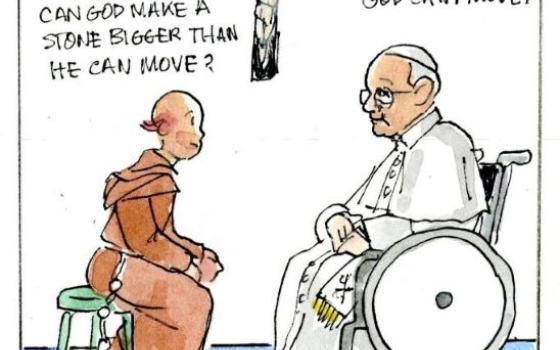On this day we celebrate the Feast of the Holy Innocents, Martyrs.
By, by, lully lullay, thow little tyne child,
By, by, lully lullay!
O sisters too,
How may we do
For to preserve this day
This pore yongling,
For whom we do singe
By, by, lully lullay?
Herod, the king,
In his raging,
Chargid he hath this day
His men of might
In his owne sight
All yonge children to slay --
That wo is me,
Bore child for thee
And ever morne and may
For thi parting
Nether say nor singe,
By, by, lully lullay.
The Mothers' Song, known today as the Coventry Carol, was the lullaby the mothers sang to their babies to keep them from crying and drawing the attention of the knights sent by Herod to slaughter them. It came at the end of the Shearmen and Tailors' Pageant, a mystery play from the Coventry cycle. The play is included in English Mystery Plays: A Selection, edited by Peter Happe. (Search term, "Herod", p. 343.)
Herod rages:
And thus schall I for-do his profece.
How sey you, sir knyghtis? ys not this the best red,
Thatt all yong chyldur for this schuld be dede,
Wyth sworde to be slayne?
Then schall I, Erod, lyve in lede,
And all folke me dowt and drede,
And offur to me bothe gold, rychesse, and mede;
Thereto wyll they be full fayne.
For more about the "boisterous character of Herod, as represented in ancient Mysteries", see A Dissertation on the Pageants or, Dramatic Mysteries Anciently Performed at Coventry, by the Trading Companies of That City, by Thomas Sharp, 1825. In the Shearmen and Tailors' play, the character may be said "to completely out-Herod the others." (Search term, "Shearmen", pp. 122-123.)
Sharp quotes the speech Herod makes at his first appearance -- on horseback. (The three kings also enter on horseback. The mystery plays were performed on carts, but there was action on the ground, as well.)
Sharp also quotes Shakespeare's three allusions to the Herod of the mystery plays. One is from Hamlet, act iii, scene 2: "It out-herods Herod."
For a list of guilds in 1415 and the pageants they were responsible for, see pp. 135-139. The Shipwrights depicted "God foretelling Noah to make an ark of light wood." The Fyshmongers showed "Noah in the ark with his wife and three children and diverse animals."
For details of the accounts kept by the guilds, the characters in the plays, the "Machinery" including the "Hell-mouth", the "Dresses" including "God's Coat of Leather", the music, the "Pageant Vehicle", etc., see pp. 66-67.



